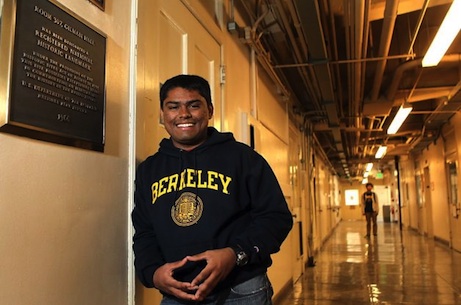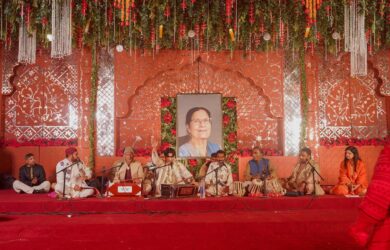
Ritankar Das' research focuses on alternative energy sources, but he is also a bit of a Renaissance man at the age of just 19.
Ritankar Das has been researching alternative energy sources for over seven years. He is also writing a book on education, has set up an NGO and is on advisory boards of several major corporations. And he has the ear of the Government.
Just last month, he attended a roundtable with several senior White House officials to discuss the role of young people in promoting STEM policy. He also attended a similar roundtable at the US State Department with several key officials to discuss the role of young people in using STEM for diplomatic purposes. He is about to begin an MPhil at Cambridge, but has already been accepted to do a PhD at MIT. All this and he has only just turned 19.
Ritankar was born in Kolkata, but he moved to the US when he was seven and grew up in south-eastern Wisconsin. He got into research at a very early age. At 12, he decided to attempt artificial photosynthesis in his kitchen with a blender after learning about photosynthesis in biology class.
“I thought that if we could do photosynthesis artificially, we could solve our energy problems,” he said. Rising energy prices had had a direct impact on his family and community and he said that learning about science had made him question whether people could artificially create the conditions for “things that nature figured out a long time ago”.
Little over a year later, he had outgrown the resources at his school and started doing research on solar cells at the University of Wisconsin, Milwaukee where he was also studying multivariable calculus at university level. At 15, he was accepted as an undergraduate at the University of California, Berkeley. Three years later, he became Berkeley’s youngest University Medalist (top graduating senior among over 6,000 students) in at least 100 years, the first Medalist ever from the Department of Bioengineering and the first from the College of Chemistry in the last 58 years. He was also the youngest inductee of the Berkeley Wall of Fame and has recently been inducted into the Young and Exceptionally Gifted Students’ Hall of Fame alongside Martin Luther King Junior and Condoleezza Rice, both of whom graduated several years early from high school.
Research
At Berkeley, Ritankar did research on gallium nitride nanowires at the US Department of Energy, finding new ways to grow nanowires for use in highly efficient solar cells. He also did research on cellulosic biofuels at the Energy Biosciences Institute and, in particular, on the development of better solvents to break down cellulose for biofuels. In addition, he travelled to Taiwan’s Academia Sinica to work on organic light-emitting diodes.
Ritankar attributes his early research prowess to having supportive parents. “They allowed me to make a mess and do crazy things. Without that I would not really have moved forward so fast,” he said.
Even though he was younger than his peer group, it didn’t stop him becoming involved in campus life. He set up the campus chapter of the American Chemical Society, the largest professional society in the world, worked as a graduate teaching assistant in Chemistry and set up the research journal, Berkeley Chemical Review. He also became an Academic Senator which involved making decisions about issues related to campus life and helping manage a $1.7bn budget.
Ritankar, who graduated from Berkeley with a double major in bioengineering and chemical biology and a minor in creative writing, also set up an NGO called See Your Future which aims to get students interested in STEM subjects. He says that the NGO aims to get young people interested in technical subjects by appealing to their inherent curiosity. “We would say ‘you’ve got a cell phone. Have you ever wondered why your calls don’t go to the phone next to you?’ After hooking them in with things that were immediately relevant to students we moved on to the more complicated physical equations,” he said. Today, See Your Future reaches 75 million people around the world.
Ritankar is writing a book on education and the skills gap between what the education system is producing and the kind of employees industry needs. He has worked with several Nobel Laureates for the book as well as students, CEOs of Fortune 100 companies, school teachers and university presidents. He believes his combination of a science and arts background is important for the future.
“Innovation is already commonplace at the interface of science and the arts in fields such as design and computer science. Arts and science are not as disparate as they might seem,” he said.
Ritankar, who has won over $500,000 in awards, including the Goldwater, Udall, and Jefferson Awards, has also served on advisory boards for Dell, State Farm, City of New Berlin, DoSomething.org and the USA Science and Engineering Festival. On the State Farm Youth Advisory Board, he helps award $5 million annually to service-learning projects. He also serves as an international advocate for the United Nations World Food Programme. He has been featured in the San Francisco Chronicle, NBC, ABC, Times of India, Mashable, and US News and World Report.
Gates
He is currently studying at the University of Oxford, where he is an MSc candidate in Biomedical Engineering and a Whitaker Fellow, researching novel computational methods in biomedical ultrasonic imaging. He said he was keen to get a different perspective on energy issues at Cambridge where he will do an MPhil in Chemistry on cellulose solvation and aims to find solvent mixtures that are more environmentally friendly and cheaper than the ionic liquids currently used to transform cellulose into biofuels.
He is excited to be named a Gates Cambridge Scholar. “I was particularly drawn by the Gates Cambridge commitment to improving the lives of others. It’s a philosophy I really embrace,” he said.












